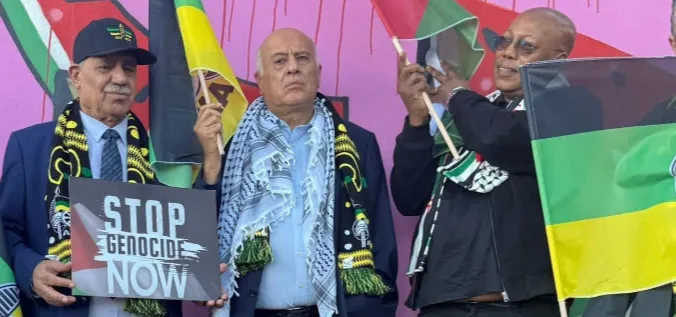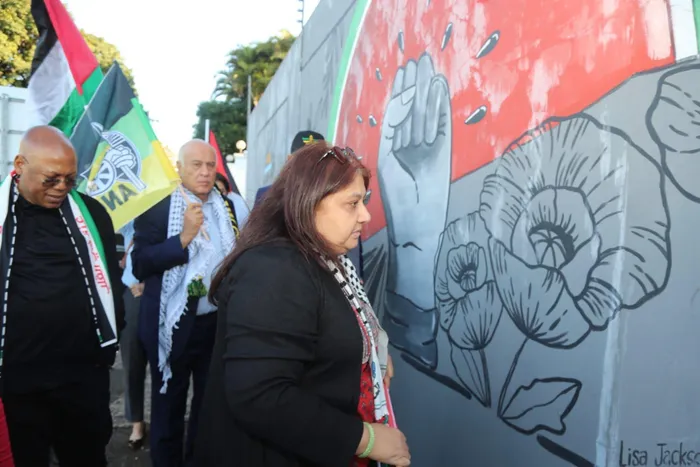
An an event at the Palestine Wall of Existence in Currie Road on Monday were, Karim Younis, Member of the Fatah Central Committee, from left, Jibril Rajoub, the Secretary General of Fatah, and Michael Mabuyakhulu.
Image: Facebook
IN A DISPLAY of international solidarity, the KwaZulu-Natal African National Congress (ANC) hosted a delegation from Fatah, a Palestinian political party, at its offices in Dr Pixley Ka-Isaka Seme House in the Durban CBD on Monday.
The engagement underscored South Africa’s continued commitment to strengthening historical ties, and provided a platform to reaffirm the country's shared struggles for justice, liberation, and human rights.
Michael Mabuyakhulu, the ANC provincial coordinator, expressed the deep-rooted connections between the struggles faced by South Africans during their own fight against apartheid and the current plight of the Palestinian people.
He highlighted the ANC’s efforts to lead the global movement to isolate oppressive regimes, evoking a vision of unity between all oppressed groups.
“Our struggle will not be complete without the liberation of all oppressed people in the world, including Palestine,” said Mabuyakhulu.

Activist Lubna Nadvi at the Wall of Existence.
Image: Facebook
"It is therefore regrettable that some people who we thought were with us during the liberation struggle are now turning their backs on the people of Western Sahara. We want to assure you that the ANC never abandoned the people of Western Sahara. We will never abandon the people of Palestine. We are not alone in this quest in our solidarity with the people of Palestine. All progressive and peace loving people across the world are behind this structure."
He spoke about heartbreaking images of malnutrition among children and the frantic rush for food aid in conflict zones.
“So remember we will always stand with the people of Palestine for loving and progressive humanity."
Jibril Rajoub, secretary general of Fatah Central Movement, which is the second-largest party in the Palestinian Legislative Council, said South Africa was celebrating its 60th anniversary of alliance this year.
“Your government's policies are really for reliability and global peace. Many countries behave as if nothing is going on and they don't even want to see. I know that the ANC stands with solidarity groups. We should continue the same operation. We should keep the same momentum of solidarity because this will be a source of power, and steadfastness to not to lose hope. Nothing is worse than to lose hope.
“We will not give up. The goal is that we have one enemy. The goal is that we cannot achieve our people's national aspirations as long as we are divided. Unity is a must. Unity is the only way to convince those who are hesitant to recognise the very existence of the Palestinian people. There are those who are looking for an excuse not to support our interests but we will fight on,” he said.
Members of Palestine solidarity organisations and civil society in South Africa also engaged with the Fatah delegation.
Lubna Nadvi, the co-founder and member of the KZN Palestine Solidarity Forum, said the ANC had, over many decades, multiple engagements with a range of groups from across Palestinian society which includes Fatah and Hamas.
“The ANC has had a strong relationship with the people of Palestine regardless of which political party they belong to and this broad engagement has enabled closer ties between South Africans and Palestinians. South African civil society has however consistently encouraged all Palestinian parties to unite and find common ground in their struggle for political self determination.”
Nadvi said while there had been broad solidarity expressed with Palestinians and their struggle for self-determination, there were also challenging questions posed to the delegation given their role and track record in the West Bank.
“The general sentiment expressed by the delegation, however, was that unity among Palestinians across the world was the most important thing to them and that was what they were working towards.”
Abdool Valodia, the president of United for Palestine, said the ongoing crisis in Palestine demanded urgent international action.
“Recent developments highlight the devastating humanitarian toll in Gaza, including mass casualties, systematic starvation, and the destruction of critical infrastructure like hospitals and dialysis centers.
“South Africa and other nations have condemned Israel’s actions as violations of international law, with the international Court of Justice scrutinising allegations of genocide. Palestinian leaders like Jibril Rajoub in his current visit to South Africa emphasises unity, calling for dialogue between Fatah and Hamas to forge a cohesive national strategy, though internal divisions and Israeli obstruction remain significant hurdles.
“The United Nations and non-governmental organisations stress the need for unimpeded aid and accountability, while proposals for a two-state solution face challenges, including US vetoes and Israeli settlement expansion.
"South Africa’s solidarity with Palestine, including legal and diplomatic efforts, underscores global shifts in public opinion against Israel’s policies,” he said.
Nasiha Soomar, an executive member of the South Africa Palestine Movement, said the ANC’s engagement with Fatah was not just a political exchange.
“It is a necessary affirmation of solidarity between two liberation movements rooted in the struggle against apartheid, injustice, and dehumanisation. But let us be absolutely clear, it is not South Africa’s responsibility to choose which Palestinian political party is legitimate. That is not our role.
“Our duty is to defend the right of the Palestinian people to determine their own future, free from occupation, free from genocide, and free from apartheid. We do not get to decide for them."
Soomar said as part of a South African delegation that previously met with Palestinian representatives, they bore witness to the grief, rage, and unbearable statistics shared by those living this “nightmare”.
“One of the most haunting testimonies came from a senior Palestinian statistician. She spoke with a quiet devastation, telling us that over 37 000 children in Gaza have lost one parent, and 17 000 have lost both.
"This number exceeds the scale of World War II. Let that sink in. Children with no one left. Entire family trees erased. These are not numbers. These are lives, stolen while the world turns its face away.
“So, while these engagements strengthen the ties between South Africa and Palestine, strength means nothing if it does not lead to action. Symbolism is not enough and statements are not enough. The children of Gaza do not need our pity. They need our power and they need us to act...
“Our duty now is to boycott every single product linked to this genocide. Our duty is to strip our shelves of bloodstained brands. Our duty is to protest, to speak, and to refuse silence. This is not a time for neutrality. It is a time for resistance. Palestine must be free,” she said.
Imraan Subrathie, a member of parliament and secretary general of United for Palestine, emphasised the need for Palestine unity similar to the South African model.
“The world can no longer ignore Palestine’s plight. Concrete steps, not rhetoric, are needed to end the occupation and uphold Palestinian rights.”